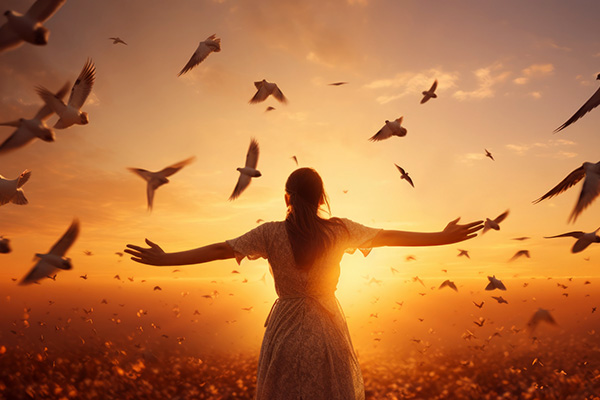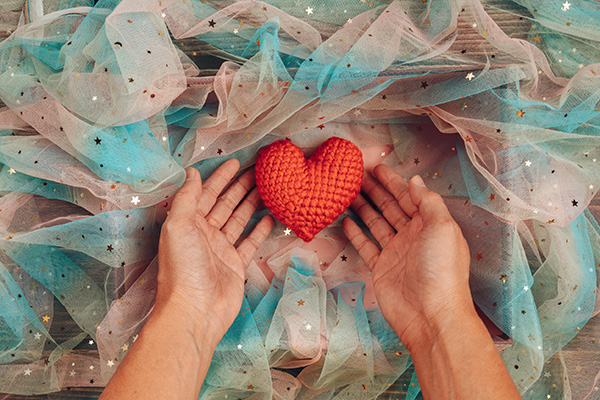spiritual principles
The Ancient Wisdom Of The Two Wolves
 The story of the Two Wolves holds a special place among my childhood favorites. The moral of this Native American wisdom tale, thought to have originated with the Cherokee tribe, serves as a daily guiding light in my life.
The story of the Two Wolves holds a special place among my childhood favorites. The moral of this Native American wisdom tale, thought to have originated with the Cherokee tribe, serves as a daily guiding light in my life.
I must confess, there is some sentimental bias on my part, as this story also brings back lovely memories of my remarkable grandfather, Sequoia, a former medicine man and chief of the Cherokee Nation.
Variations of the story exist in various Native American cultures, and it typically goes like this:
One evening, an old Cherokee is teaching his granddaughter about life and says, “My daughter, a fight is going on inside all of us each day. It is the battle between the two wolves.”
“One wolf is evil — anger, envy, jealousy, sorrow, regret, greed, arrogance, self-pity, guilt, resentment, inferiority, lies, false pride, superiority, and ego. The other wolf is good — joy, peace, love, hope, serenity, humility, kindness, benevolence, empathy, generosity, truth, compassion, and faith.”
The granddaughter thinks about it for a minute and then asks her grandfather, “Which wolf will win?”
The Compassion Of Tough Love
 We have an amazing tool within us: our heart. Not only does it keep us alive, but it also allows us to feel deep emotions, such as love and resentment, joy and sadness, achievement and loss, compassion and apathy.
We have an amazing tool within us: our heart. Not only does it keep us alive, but it also allows us to feel deep emotions, such as love and resentment, joy and sadness, achievement and loss, compassion and apathy.
Many people fail to see the power of the heart and what we as humans can do with that power for ourselves and others. The heart is in fact key to our personal and spiritual learning and our soul expansion in this lifetime.
However, many of us who strive to contribute to a better world with the power of our loving hearts have also seen that giving material things, like money, and trying to help those who refuse to help themselves, does not cure the suffering in the world. It usually only puts a band aid on the underlying problems and in time it just returns as additional problems.
We all have our own karmic lessons, and if not learned it becomes a recurring issue until we finally learn to fix it, learn from it, and move forward. Then it is no more a lesson, but a wisdom.
It is also true that we can get in the way of others learning their lessons. Sometimes we jump in too quickly or end up taking on their burden, only to find it happening again and again. Then all our efforts and sacrifice were in vain.
Free Yourself From Karmic Debt This Year
 With the start of a new year, many of us are eager to set new financial goals and improve our overall financial situation. For those struggling with debt, the new year can be a great time to take control of your finances and make a plan to get out of debt.
With the start of a new year, many of us are eager to set new financial goals and improve our overall financial situation. For those struggling with debt, the new year can be a great time to take control of your finances and make a plan to get out of debt.
But there is more to our life journey than financial debt. There is also the much more important soul debt known as our karma. A debt that for some of us may require much more urgent attention.
Karmic debt is the result of all the negative actions we take in this life, and in past lives, that have consequences beyond our present existence. If we accumulate bad karma through actions that cause harm to others or ourselves, we will experience negative consequences in this life, or in a future life. These karmic consequences will in time manifest as difficulties, challenges, obstacles and sufering in our lives. Similarly, if we accumulate good karma through deeds that benefit others, we will experience positive consequences such as abundance, happiness, health, and success.
If you feel persistently stuck in some kind of negative cycle, burdened by what feels like repeated bad luck, hard times, or difficult relationships, karmic debt is most likely playing a role. Breaking these patterns requires that you take responsibility for your misdeeds or inappropriate actions in the past.
The Amazing Law Of Vibration
 There are seven universal laws that govern the universe and all that exists within it. By understanding and applying the principles of these laws, we can create a more positive, empowered and fulfilling life for ourselves.
There are seven universal laws that govern the universe and all that exists within it. By understanding and applying the principles of these laws, we can create a more positive, empowered and fulfilling life for ourselves.
The first three laws are known as the Higher Immutable Laws, which means that they are fundamental metaphysical principles that are absolute and eternal. They have always existed and are always at work, whether we are aware of them or not. They also cannot be changed or transcended in any way, whether we like it or not.
The three immutable universal laws are:
The Law of Mentalism: Everything is mind, the universe is conscious.
The Law of Correspondence: As above, so below; as below, so above; as within, so without.
The Law of Vibration: Everything is energy in constant motion, vibrating at different frequencies.
The remaining four laws are the lower mutable laws, meaning they are adaptable or changeable and can be influenced, altered or transcended by our thoughts, beliefs and actions to create a more ideal existence.
The True Meaning Of Holiday Gifts
 While wrapping Christmas gifts for family and friends today, I thought about whether it is better to be on the giving or receiving end of presents during the holiday season?
While wrapping Christmas gifts for family and friends today, I thought about whether it is better to be on the giving or receiving end of presents during the holiday season?
In my childhood, receiving presents was undoubtedly the best! But my parents also taught me the importance of giving. They gave my sister and me a small allowance during the holidays to buy gifts for others. It was fun to shop for small items to give to our loved ones. With much anticipation, wetried to pick things that people would actually like and appreciate.
I therefore learned early on that while receiving gifts can be exciting and fun, giving them can be even more rewarding.
My parents were certainly on to something, because the value of giving has been scientifically proven to be more than just a sweet sentiment. For example, according to a study by the American Psychological Association, giving to others increases life expectancy by at least five years! Another study found that people who give to others experience lower blood pressure, less depression, and lower stress levels. In addition, giving to others can increase happiness and well-being. A Harvard Business School study found that giving money to someone else increased participants’ happiness more than spending it on themselves.
The Spiritual Importance Of Releasing Resentments
 I went out for lunch today and had a bad service experience with the waitress. It was as if she didn’t care much to listen to what I wanted. She seemed distracted and careless.
I went out for lunch today and had a bad service experience with the waitress. It was as if she didn’t care much to listen to what I wanted. She seemed distracted and careless.
Two and a half months ago, I had a similar experience at another restaurant when the server packed the wrong items for me to take home. I felt ignored, even disrespected. Today’s experience brought back the same feelings and memories.
I was so upset that I decided I was not going to leave her a tip. But then, in the middle of my meal, while feeling angry and somewhat sorry for myself, I overheard a nearby customer calling her friend by the same name as my late mother.
This caused me to pause and reflect on my toxic thoughts about the careless waitress. You see, my mother was also a waitress many years ago. It was how she put food on the table and put us through school.
Perhaps today’s events were meant to remind me during the holiday season how many of us go through life with unhealed “mother wounds.”
Spirit now had my attention and proceeded to make me aware that my waitress had her own issues with her mother growing up, and that she is now a single mother herself, barely making ends meet. This realization instantly changed my perspective and my petulant attitude.
Harnessing Intuition To Be A Better Manager
 In the demanding landscape of modern business, effective leadership is more important than ever. As a leader, navigating the complexities of the workplace requires a unique set of skills, and while data-driven decision-making and strategic planning are undoubtedly important, there are powerful tools that are often overlooked: intuition and spirituality.
In the demanding landscape of modern business, effective leadership is more important than ever. As a leader, navigating the complexities of the workplace requires a unique set of skills, and while data-driven decision-making and strategic planning are undoubtedly important, there are powerful tools that are often overlooked: intuition and spirituality.
Inner wisdom and spiritual awareness are invaluable assets for managers seeking to improve their leadership skills. By cultivating a deeper connection with our inner being and the universe, we gain access to a source of wisdom and guidance. It enables one to tap into a deeper understanding and a higher level of consciousness that gives you a winning edge of increased empathy and nuanced awareness in the workplace.
True intuition is more than guesswork or simply a culmination of our past experiences, knowledge, and insights. It is a mystical force, a spiritual superpower, a key component of our inner guidance system.
As a leader, you’ve probably faced countless challenges and solved numerous problems throughout your career. Intuition allows you to tap into the inner guidance of your higher self to make better decisions and more accurate judgments.